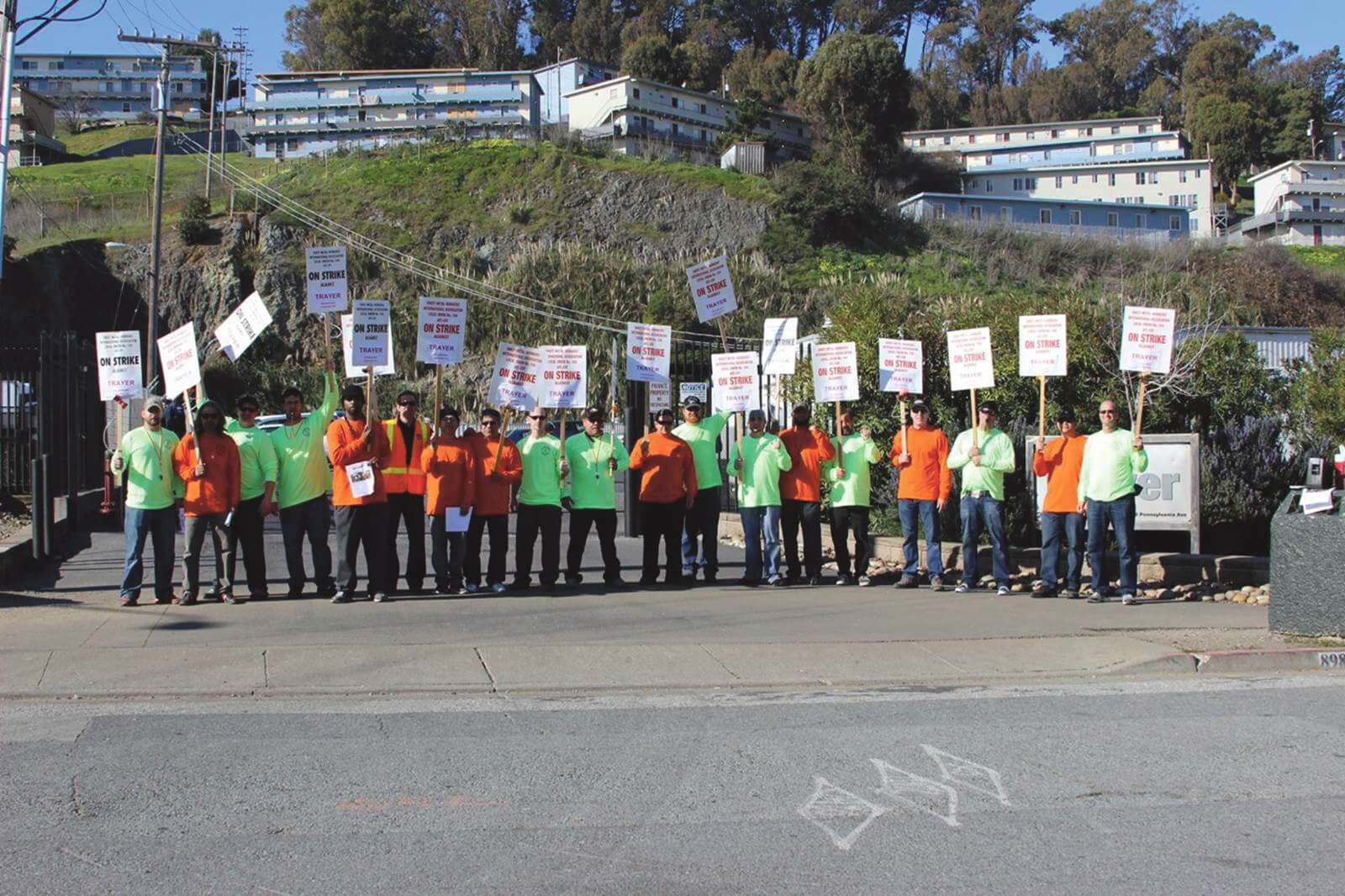Since January 19, 2015, 22 members of Sheet Metal Workers’ (SMW) Local 104 have been on strike, forming a picket line outside Trayer Engineer-ing Corporation’s shop and offices at 898 Pennsylvania Avenue. In early February, International Brotherhood of Electrical Workers (IBEW) members joined SMW 104 on the picket line. The IBEW chapters supporting SMW Local 104 include Locals 595, 332, 617, 684, 332, 551, and the International IBEW.
According to SMW Local 104 busi-ness representative Richard Koenig, the union has been trying to resolve a contract dispute for almost two years. “The members rejected the company’s last and final proposal on January 2, 2015. They voted to go on strike because the company wants to cut the members’ pay by 37 percent and eliminate the union health care plan,” he said. “These members are highly skilled, highly trained craftsmen who are worth every penny. They’re asking for a fair wage and better working conditions, not a step backwards.”
Koenig said Trayer manufactures switchgear, such as the standard stainless steel electric switches used by Pacific Gas and Electric Company (PG&E) as part of distribution under-grounding. Trayer’s switchgear is also used by San Diego Gas and Electric Company (SDG&E).
According to Aaron Norrbaum, SMW Local 104 shop steward, Trayer has recruited less experienced non-union substitute workers from Minnesota to meet company deadlines. “It’s dangerous if tolerances aren’t right. It can be explosive and send manhole covers up,” said Norrbaum.
Trayer Engineering Corporation didn’t return calls from the View. A PG&E spokesperson stated that the monopoly utility didn’t want to comment on the strike, seeing the matter as an internal concern for Trayer Engineer-ing. Sempra Energy, SDG&E’s parent company, also didn’t return calls.
“In simple terms, switchgear is a term used to describe switches, like a huge light switch, used in large commercial, industrial, and utility electrical systems,” said John Caskey, assistant vice president of industry operations for the National Electrical Manufacturers Association, which is headquartered in Rosslyn, Virginia. “These switches can operate at 480 volts up to 500,000 volts. In most cases, the higher the voltage, the greater the damage done by an equipment failure,” said Caskey.
Some of the switchgears that Trayer makes contain SF6 gas, identified by the U.S. Environmental Protection Agency as a greenhouse gas, and oil. The greasy fluids insulate the electrical wiring in the metalwork. The oil and SF6 gas are highly flammable. “In general, any improperly made electrical product can lead to electric shorts, fire and possibly personal injury,” Caskey said.
Norrbaum said safety is a concern for sheet metal workers. “I’ve been at Trayer just over 15 years. Most of the guys have been working there for over 25 years. You can feel the quality work in the switchgears that are made by hand. We don’t build them on a Computer Aided Design model. Somebody out there in the field has got to throw this stuff by hand if (they’re) not auto-mated,” he said.
According to Norrbaum, Trayer is a family business; the atmosphere has historically been friendly. The enterprise was founded in 1962 by Frank Trayer, the father of current owner John Trayer. The company fell on hard times in the early-2000s when its major customer, PG&E, went bankrupt. “Trayer was owed hundreds of thousands of dollars, and guys at the shop were as much as two paychecks behind,” said Norrbaum. “We stuck it out because we were working for our own future as much as theirs. Over the last five years, things started to decline. The incentive and bonus programs were taken away, and some administrative staff suffered a half cut in pay.”
Norrbaum said John Trayer wanted to improve his profits by lowering wages for the sheet metal workers, which reduced employee morale. An accounting error made in calculating the sheet metal workers’ cost of living adjustment deepened the rift. “John was telling us we had over a million dollars of his money and he wanted it back. We couldn’t write him a check. We told him we were willing to freeze or cut our pay to do something to help, but it wasn’t enough. He wanted it now,” said Norrbaum.
Norrbaum said SMW Local 104 members are concerned that Trayer incurred extensive costs that they saw as unnecessary in recent years. These included bills for additional trailers and fees to consultants who weren’t familiar with the way the business worked and lawyers who didn’t resolve labor disputes. “Our main engineer quit, be-cause of how he was being treated. He’d had a relationship with John Trayer for 40 years. Our sales guy who had been there for 10 years quit,” said Norrbaum.
According to Norrbaum the labor dispute can still be resolved. “It is fix-able. We are still ready to make cuts but we’re not going to give up health care,” he said. “I’m not going to go anywhere. I need to get these guys’ jobs back. We can all make a good living if the owner does it right. I don’t know what the alternative is.”


